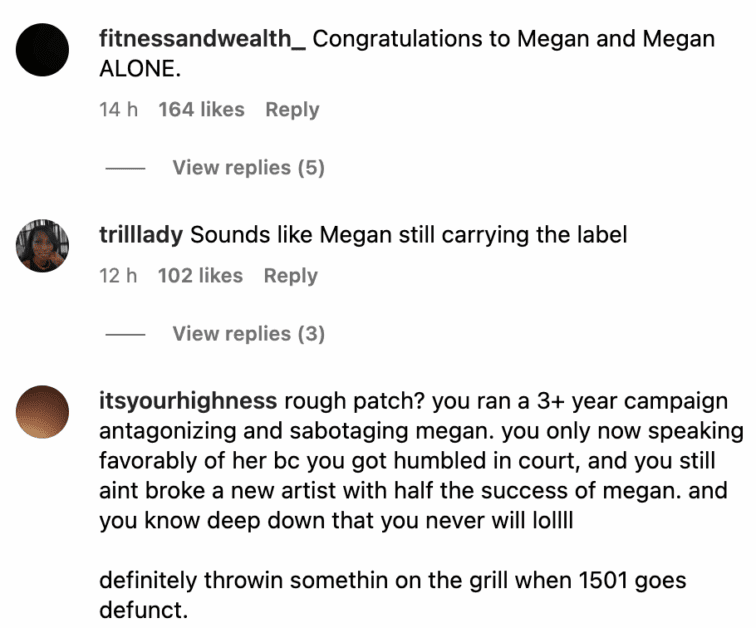
Megan Thee Stallion Fans Drag Carl Crawford For Flexing RIAA Plaques

Carl Crawford tried to celebrate his past success with Megan Thee Stallion on Tuesday (June 3) by flashing his new RIAA plaques on Instagram, but the internet wasn’t in the mood for nostalgia.
“GOD IS GOOD,” Crawford wrote in the caption of his video post, which showed him holding multiple gold and platinum certifications. “Shoutout to Megan Thee Stallion. We had a little rough patch, but real ones always push through. Just got my new @riaa_awards plaques in… it’s a blessing to keep growing and keep building. Appreciate the journey, appreciate the lessons. Time to hang these up in the new studio.”
The post quickly drew criticism from users who felt Crawford was taking credit for Megan’s accomplishments despite their messy legal fallout.
One commenter wrote, “Can’t get anyone else signed huh,” to which Crawford fired back, “don’t need to. I hit the jackpot on my first try.”
Another user added, “I know u regret fumbling Meg everyday,” prompting Crawford to respond, “fumbling? What u mean? Our contracts ended.”
Crawford also addressed the backlash in his Instagram Stories, defending his role in Megan’s rise.
“I tell you what it was, it was my money,” he said. “Everybody know, it take money to break an artist. $2 million to be exact.”
The tension between Carl Crawford and Megan the Stallion dates back to 2020 when she sued his label, 1501 Certified Entertainment, claiming it blocked her from releasing music and locked her into an exploitative contract she signed at 20 years old.
Megan alleged she was owed over $1 million in royalties and accused the label of sabotaging her career by refusing to count her 2021 project, “Something for Thee Hotties,” as an album.
Crawford and 1501 countersued, arguing Megan owed them more than $10 million from tours, merchandise and endorsements.
The legal fight dragged on through 2022 until both parties reached a confidential settlement in October 2023, agreeing to part ways.
Following the split, Megan began releasing music independently and funding her own projects. Crawford later admitted the original deal wasn’t fair.
“I didn’t fully understand the business at the time,” he said. “Back then, we just came in with a number—like us taking 40 percent of [Megan’s] net [profit]. That was just me not knowing the business.”

